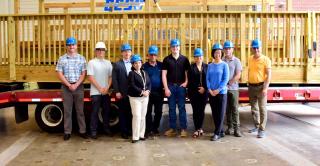
Central to Understanding Universal Behavior.
The Central BS in Physics emphasizes in-depth inquiry into basic physical principles, analytical techniques, applications of physics, and critical thinking. The program prepares students for graduate study in fundamental and applied physics, or for positions in wide variety of STEM and other professional careers.
The Physics program requires a minor in any subject or a concentration in at least one of the following: Engineering Physics, Biology, Biomolecular Science, or Finance. Students in the program go on to graduate school for further study in physics, engineering, law school, medical school, and medical physics; to entry-level research and development positions in industry; and a host of other options. Central also offers a BS in Physics for Teacher Certification.
Program Features
- Offers varied optional concentrations for students seeking specific competencies in cutting edge interdisciplinary fields
- Unique undergraduate research opportunities that involve students in the high-impact practice of real-world research
- Research findings presented at conferences
- Opportunities to gain valuable skills to excel in graduate schools or the workplace
- Specialized tracks allow students to pursue education in individual interests while still earning employable skills
- Internship opportunities
- Financial aid and scholarships available
- Free on-campus child care available
Program Options
Integrates intensive study of Physics, Engineering, and Mathematics to provide a strong applied and analytical skill-set for areas such as aerospace, materials science, nanotechnology, renewable energy systems, photonics, and microelectronics. Program prepares students for employment or graduate study in any of these areas of innovation.
Physics, finance, and economics have had a long history together. Many theories used in finance and economics were derived by physicists. For example, a co-recipient of the first Nobel Prize in Economic Science in 1969 was a physicist. Today, the world of finance and economics, seeks physicists and others with strong analytical skills, known as quants, to fill their need for quantitative analysis. In addition to traditional careers in research, education, and engineering, the Finance Concentration prepares students to work in institutions or related areas, institutions, or pursue graduate studies in Finance, Economics, and Law.
Businesses exhibit a demand for professionals who understand and use the complex mathematical models that are the backbone of complex decision making and can help mitigate risks, enhance the smooth running and success of large and small businesses. The Accelerated Pathway prepares graduates to meet the complex challenges in businesses, especially in technology related Institutions. Students may choose various career pathways (General Business, Business Analytics, Finance, Marketing, Management, Accounting, Supply Chain, and Sports).



